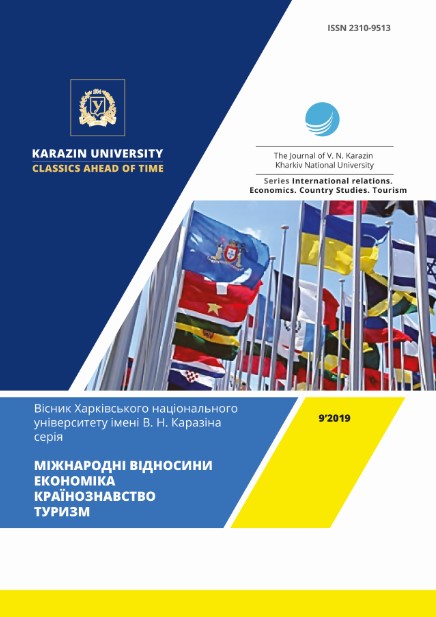Prospects for the use of blockchain technology in the tourism industry
Abstract
Nowadays, Blockchain is one of the most desired technologies, because almost every industry seeks to apply it. Tourism was no exception. Manufacturers of services on the basis of a distributed database claim that thanks to the blockchain it is possible to completely get rid of the monopoly in the market, which in turn will lead to lower prices for services and increase the level of tourist comfort. The technology was first applied to the Bitcoin network. Now blockchain finds application in a wide variety of areas, from processing financial transactions to storage of data on the purchase of virtual cats. The tourism sector can use the blockchain to store publicly available information about the quality of hotels and the behaviors of tourists, to process transactions for the purchase of tickets and reservation of housing, to create databases for storing identity cards, etc. The subject of the article research is the use of blockchain in the tourism industry. The goal is to analyze the current state and determine the prospects for using blockchain technology in the tourism business. The tasks are to highlight the main problems and prospects for using the blockchain, as well as formulating a strategy for using this technology in the tourism market as a means of improving the quality of travel. The study uses theoretical, methodological and systematic methods of source analysis, including statistical materials, regulatory documents, scientific articles to assess the state of the use of blockchain technology in tourism and the prospects for its application. The following results were obtained: the main directions of the use of the blockchain in tourism were identified, its influence on the creation of a more diverse and flexible offer in the tourism services market. It is concluded that blockchain technology can provide greater security and transparency in the tourism industry thus increasing its profitability, which in turn affects the creation of new jobs and the standard of living of the population.
Downloads
References
Dik V. V., Staroverova O. V., Urincov A. I. (2016). Tekhnologicheskaya i organizacionnaya virtualizaciya predpriyatiya v usloviyah informacionnogo obshchestva [Technological and organizational virtualization of the enterprise in the information society]. Simferopol': Izdatel'stvo: Krymskij federal'nyj universitet im. V.I. Vernadskogo. (in Russian)
Makhovka V. M. (2018). Interaktyvni ta Smart-tekhnolohii v turyzmi. Metodolohiia ta praktyka staloho rozvytku turyzmu: kol. Monohrafiia [Interactive and smart technology in tourism. Methodology and practice of steel tourism development: count. monograph]. Poltava: Astraia. (in Ukrainian)
Alejandro Cancelas. (2018). What We Can Expect From Blockchain in the Tourism Industry. Available at: https://www.wearemarketing.com/blog/what-we-can-expect-from-blockchain-in-the-tourism-industry.html
Chokun, J.. Who accepts bitcoins as payments? (2016) Available at: https://99bitcoins.com/who-accepts-bitcoins-payment-companies-stores-take-bitcoins/
Colombo, E., & Baggio, R. (2017) Tourism distribution channels: Knowledge requirements. In N. Scott, M. De Martino, & M. Van Niekerk (Eds.). Knowledge transfer to and within tourism: Academic, industry and government bridges. UK: Emerald.
Giancaspro, M. (2017). Is a ‘smart contract’ really a smart idea? Insights from a legal perspective. Computer Law and Security Review. Available at: http://www. sciencedirect.com/science/article/pii/S026736491730167X
Iansiti, M., & Lakhani, K. R. (2017). The truth about blockchain: It will take years to transform business, but the journey begins now. Harvard Business Review, (January–February), 118–127.
Leung, D., & Dickinger, A. (2017). Use of Bitcoin in online travel product shopping: The European perspective. In R. Shegg, & B. Stangl (Eds.). Information and communication technologies in tourism 2017 (pp. 741–754). Springer.
Narayanan, A., Bonneau, J., Felten, E., Miller, A., & Goldfeder, S. (2016). Bitcoin and cryptocurrency technologies: A comprehensive introduction. Princeton: Princeton University Press.
Sixtin, E. (2017) TUI tourism group will adopt Ethereum blockchain technology Available at: https://btcmanager.com/tui-tourism-group-to-adopt-ethereums-blockchain/
World Economic Forum Available at: https://www.weforum.org/
Citations
FINANCING THE IMPLEMENTATION OF HR ENGINEERING IN MANUFACTURING ENTERPRISES IN THE CONTEXT OF THE COUNTRY'S DIGITAL ECONOMY FORMATION
Bumane Inga, Zvirgzdina Rosita, Hura Nadiia, Metelytsia Volodymyr, Otenko Iryna & Bialoshytskyi Mykhailo (2024) Financial and credit activity problems of theory and practice
Crossref
Modern trends and prospects for the introduction of information technologies in the Ukrainian tourism industry
(2020) Journal of Economics and International Relations
Crossref
Authors who publish with this journal agree to the following terms:
- Authors retain copyright and grant the journal right of first publication of this work under the terms of a license Creative Commons Attribution License 4.0 International (CC BY 4.0).
- Authors are able to enter into separate, additional contractual arrangements for the non-exclusive distribution of the journal's published version of the work (e.g., post it to an institutional repository or publish it in a book), with an acknowledgement of its initial publication in this journal.
- Authors are permitted and encouraged to post their work online (e.g., in institutional repositories or on their website) prior to and during the submission process, as it can lead to productive exchanges, as well as earlier and greater citation of published work.




